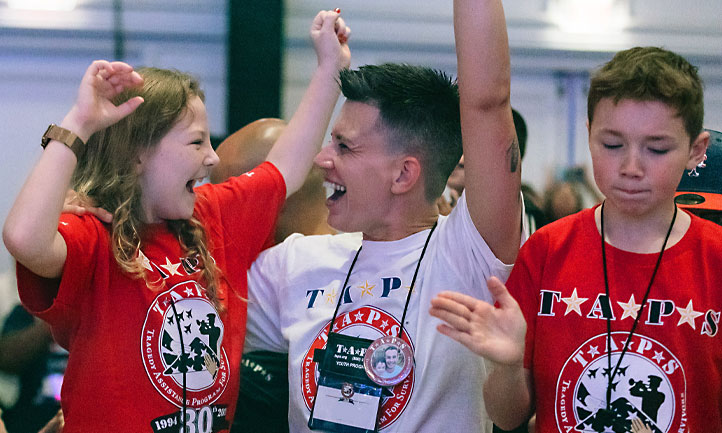Parenting in Grief: Modeling Virtues That Promote Positive Growth
Author: Andy McNiel
This year's Youth Programs theme is “Virtues That Promote Positive Growth After a Loss.” Last year, we examined how loss transforms us and how our personal choices in the midst of grief impact that transformation. The 2025 theme builds on this concept by focusing on particular behaviors or character traits we learn, practice, and develop as we grieve. There are so many aspects of grief that we cannot fully control, but this year’s theme aims to provide tangible behaviors and tools our kids can add to their lives to influence positive growth, even in the wake of tragedy. To put it another way, we cannot always choose our circumstances, yet we can choose how we walk through those circumstances. We are inviting parents, caregivers, grandparents, and other family members to join us this year by modeling virtues of growth after loss for the children in your lives and sharing some of the virtues we will highlight this year and ways you might model them for your children.

Patience
Patience is the ability to live with disappointment, suffering, or setbacks in life — with life events, with others, and even with ourselves. While patience does not get rid of our grief, it does enable us to live through our grief. Grief disrupts our lives and is a heavy burden to carry. We do not have the power to eliminate grief from our lives or the lives of our children. Yet, the reward of patience is the ability to give grace to ourselves and offer grace to others as we walk through all the challenges brought on by our loss. Patience will also help us as we do the hard work of modeling virtues of growth for our children. This is not easy and will require us to be patient with ourselves as we learn to incorporate these virtues into our daily lives. Some days we will be able to do this better than others. Keep in mind that each of the virtues outlined here are things we practice and grow into.
Fortitude
Fortitude is finding a strength of mind that enables us to endure hardship with courage. As a child, I — and many other little boys — heard, “Big boys don’t cry,” which is a misrepresentation of fortitude. So, it is important to clarify what we mean by courage. Acting courageously does not mean there is no fear, sadness, anger, frustration, or an array of emotions that are a part of grief. It also does not mean there are no tears or outward expressions of grief. On the contrary, being able to lean into and experience our grief, cry when we need to, and express our emotions when we need to are all courageous acts. Fortitude is the ability to adapt to our loss, bear the pain, and carry our grief. Fortitude is our ability to put one foot in front of the other and continue to move even when we do not feel like it.
Prudence
Prudence is the act of considering your options and then acting. Another way to think about it is proactivity over reactivity. The ability to control one’s actions while grieving is a virtue that will serve you and your children well. We live in a very reactive society today, which can come out as angry behaviors or outbursts — often directed at others. Grief can drain our energy, making it much more challenging to make prudent choices. This is to be expected and is normal. We can learn from those moments when we are more reactive than proactive. Though we may miss the mark many times, children will see even the small things we do to be more proactive and less reactive. If we make the effort, grief will provide many opportunities to reinforce the virtue of prudence, learn from those moments when we are reactive, and lean into opportunities to choose our attitude and behavior, no matter what our circumstances might be.
Gratitude
Gratitude is the ability to notice the good things in our lives regardless of what difficulties we might also be facing. Life events are most often a mix of both good and bad things; rarely is it one or the other. Loss, however, can cast a shadow over the good things in our lives, making it challenging to experience gratitude. Some of these good things might be the people in our lives, our personal abilities, work-related events, or personal life circumstances. Though it may be difficult, noticing good things for which we can be thankful can help balance our perspective, mood, and attitude. One activity we do with children often at TAPS is making a list of all the things for which we have gratitude. This is an activity you can do with your children at home.

Modeling these virtues after loss can strengthen the entire family’s ability to experience positive growth even in grief. Remember, show yourself and your children grace as you navigate all the challenges of grief and loss. Begin practicing the virtues of patience, fortitude, prudence, and gratitude, and make note of the differences you see in yourself and your children as these virtues are woven into your lives.
Specialized Programming for Surviving Kids
Interested in all TAPS has to support the unique needs of grieving children, teens, and families? Learn more about TAPS Youth Programs, including Good Grief Camps, Family Camps, Legacy and Military Mentors, online resources, and more.
Andy McNiel, MA, is the Senior Advisor, TAPS Youth Programs. Andy is dedicated to supporting children, teenagers, and families through grief, bereavement, and the general challenges of parenting and growing up. His commitment to healthy children and families is articulated through his work overseeing, developing, and facilitating TAPS Youth Programs, which support young military survivors and their caregivers.
Photos: TAPS Archives
